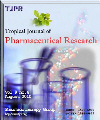
|
Tropical Journal of Pharmaceutical Research
Pharmacotherapy Group, Faculty of Pharmacy, University of Benin, Benin City, Nigeria
ISSN: 1596-5996
EISSN: 1596-5996
Vol. 16, No. 6, 2017, pp. 1293-1297
|
 Bioline Code: pr17165
Bioline Code: pr17165
Full paper language: English
Document type: Research Article
Document available free of charge
|
|
|
Tropical Journal of Pharmaceutical Research, Vol. 16, No. 6, 2017, pp. 1293-1297
| en |
Inhibitory effect of rhubarb on intestinal α-glucosidase activity in type 1 diabetic rats
Hou, KJ; Lin, CJ; Chen, C; Wu, BT; Wang, XH & Zhu, D
Abstract
Purpose: To investigate the inhibitory effect of rhubarb on α-glucosidase activity in the small intestine of rats with type 1 diabetes.
Methods: Type 1 diabetic rat model was established by intraperitoneally injecting 30 male SD rats with
1 % streptozocin (STZ). Rats with fasting blood glucose > 11 mmol/L (24) were used for the study. The
rats were randomly divided into three equal groups including control, acarbose and rhubarb groups.
Arcabose® (20 mg/kg /day) and rhubarb (100 mg/kg /day) were given by intra-gastric route via insertion
of the cannula through the esophagus. Daily fasting blood glucose and daily postprandial glucose levels
were assayed for all groups. On day 6, postprandial blood glucose, blood levels of C-peptide and
insulin, and intestinal α-glucosidase were also determined.
Results: There were no significant differences in levels of C-peptide, insulin and fasting blood glucose
between control, Acarbose® and rhubarb groups (p > 0.05). However, α-glucosidase activity at 0, 30, 60
and 120 min in the rhubarb group was 1759.2, 1812.8, 1379.8 and 772.1 U, respectively,) while in the
Acarbose® group it was 178.6, 1260.1, 1126.5, 599.2 U, respectively. α-Glucosidase activity in both
groups initially showed an increase (p < 0.05), followed by a decline from 60 to 120 min (p ˂ 0.05). After
120 min, α-glucosidase activity in each of the two groups was significantly decreased compared with
untreated control (1200 U) (p ˂ 0.05).
Conclusion: The inhibitory effect of rhubarb on intestinal α-glucosidase activity of Type 1 diabetic rats
is comparable to that of Arcabose®.This suggests that this plant may have clinically potent anti-diabetic
properties.
Keywords
Type 1 diabetes; α-Glucosidase activity; Acarbose®; Rhubarb; Postprandial glucose level
|
| |
© Copyright 2017 - Pharmacotherapy Group, Faculty of Pharmacy, University of Benin, Benin City, 300001 Nigeria.
Alternative site location: http://www.tjpr.org
|
|
